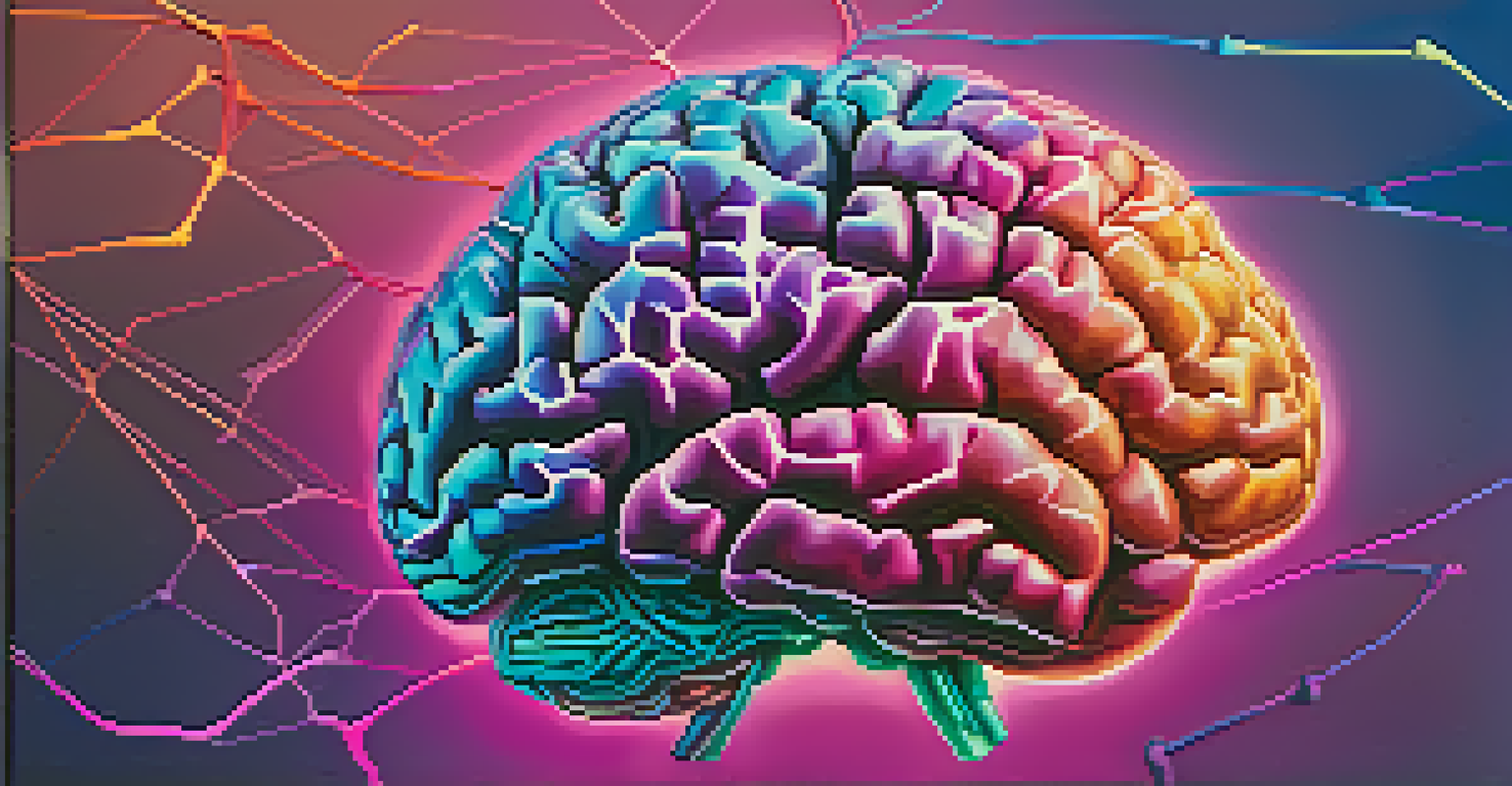The Future of Psychedelic-Assisted Therapy and Consciousness

Understanding Psychedelic-Assisted Therapy: A Brief Overview
Psychedelic-assisted therapy combines traditional psychotherapy with psychedelic substances to facilitate healing. This innovative approach aims to tap into the profound psychological effects of substances like psilocybin and MDMA. By leveraging these experiences, therapists help patients confront deep-seated traumas, anxiety, and depression. It's a fascinating intersection of science and spirituality, where the mind's potential is explored in new ways.
Psychedelics can help us confront our deepest fears and traumas, leading to profound personal growth.
Historically, psychedelics have been stigmatized, often associated with counterculture movements. However, recent research is shifting this narrative, revealing their potential therapeutic benefits. Studies have shown that psychedelics can create lasting changes in mood and behavior, often after just a few sessions. As society begins to embrace this perspective, the future of mental health treatment looks promising.
The resurgence of interest in psychedelics is also leading to changes in legislation. Various regions are beginning to decriminalize or regulate these substances, allowing for more controlled therapeutic use. This shift not only opens doors for researchers but also for patients seeking alternatives to conventional treatments. The landscape of mental health care is on the verge of transformation, driven by these powerful compounds.
Scientific Foundations: What Research Tells Us
Recent studies have illuminated the biological mechanisms behind psychedelic substances. For instance, psychedelics are known to increase neuroplasticity, the brain's ability to reorganize itself by forming new neural connections. This is crucial for therapy, as it can help individuals break free from detrimental thought patterns. By understanding these mechanisms, therapists can better tailor their approaches to maximize effectiveness.

One landmark study from Johns Hopkins University showed significant reductions in depression and anxiety among terminally ill patients after just one psilocybin session. Participants reported profound experiences that shifted their perspectives on life and death. Such findings underscore the potential of psychedelics not only for alleviating symptoms but for fostering deep emotional and spiritual growth.
Psychedelics Transform Mental Health
Psychedelic-assisted therapy combines traditional psychotherapy with psychedelics to address deep-seated mental health issues like PTSD, depression, and anxiety.
As research continues to evolve, collaboration between scientists, clinicians, and regulatory bodies becomes essential. By ensuring that studies adhere to rigorous ethical standards, the field can develop a robust foundation of knowledge. This commitment to science will help demystify psychedelics and establish their role in modern therapy, paving the way for broader acceptance.
Therapeutic Applications: Treating Various Mental Health Issues
Psychedelic-assisted therapy shows promise for a range of mental health conditions, including PTSD, depression, and addiction. For instance, MDMA has been particularly effective in treating PTSD, allowing patients to access and process traumatic memories in a safe environment. The therapeutic alliance between patient and therapist is strengthened during these sessions, enhancing the healing process.
The future of medicine is not just about treating symptoms but about healing the whole person.
Moreover, psychedelics can promote emotional breakthroughs that might be difficult to achieve through traditional therapy alone. Many patients report experiencing a sense of interconnectedness and acceptance, which can lead to lasting changes in behavior and outlook. This shift is often accompanied by a newfound clarity about their challenges, allowing for more constructive coping strategies.
As more clinicians become trained in this approach, we can expect to see an increase in diverse therapeutic applications. With the right support and guidance, individuals suffering from chronic mental health issues may find relief where conventional methods have failed. This evolution could redefine how we view and treat mental health, emphasizing the importance of holistic healing.
Challenges and Concerns: Navigating the Landscape
Despite the promising potential of psychedelic-assisted therapy, several challenges remain. One primary concern is the need for comprehensive training for therapists to ensure safe and effective practices. Without proper education, the risk of misuse or misunderstanding of these substances could undermine their therapeutic benefits. Establishing clear guidelines is crucial to safeguarding this emerging field.
Additionally, the stigma surrounding psychedelics can hinder acceptance within the broader medical community. Many practitioners may still hold outdated beliefs about these substances, leading to reluctance in incorporating them into their practices. Overcoming this stigma will require ongoing education and open dialogue about the benefits and risks associated with psychedelics.
Research Validates Therapeutic Benefits
Studies reveal that psychedelics can enhance neuroplasticity and promote significant emotional breakthroughs, offering a new avenue for healing.
Finally, as demand for psychedelic therapy grows, there is a concern about access and equality in treatment. Ensuring that these therapies are available to all individuals, regardless of socioeconomic status, will be vital. If left unaddressed, disparities in access could perpetuate existing inequalities in mental health care.
Integration of Experience: The Role of Aftercare
One crucial aspect of psychedelic-assisted therapy is the integration of experiences post-session. Patients often undergo profound emotional and psychological shifts during their sessions, and processing these experiences is essential for long-term benefits. Integration therapy helps individuals make sense of their journeys, allowing them to apply insights to their daily lives.
Therapists play a key role in this integration process, guiding patients through reflections on their experiences. By encouraging discussions about emotions, thoughts, and realizations, therapists can help patients develop actionable strategies. This ongoing support can be instrumental in cementing the positive changes initiated during their psychedelic sessions.
Furthermore, community support groups can enhance the integration process. Sharing experiences with others who have undergone similar journeys fosters a sense of belonging and understanding. This communal aspect can be incredibly healing, as individuals recognize they are not alone in their struggles and triumphs.
Ethics and Responsibility: A New Paradigm in Therapy
As we venture into the realm of psychedelic-assisted therapy, ethical considerations take center stage. Practitioners must prioritize the well-being and autonomy of their clients, ensuring informed consent is obtained. This means clearly communicating the potential risks and benefits of the therapy, allowing clients to make empowered decisions about their treatment.
Another ethical consideration involves the potential for exploitation. With the growing interest in psychedelics, there’s a risk of commercializing these therapies without adequate safeguards. Ensuring that ethical standards are upheld will be vital in maintaining the integrity of the field and protecting vulnerable populations seeking help.
Ethics Essential for Safe Practices
As interest in psychedelic therapy grows, ensuring ethical standards and therapist training is crucial to prevent misuse and safeguard patient well-being.
Ultimately, as we redefine the boundaries of mental health treatment, a commitment to ethical practice will shape the future of psychedelic-assisted therapy. By prioritizing responsibility and respect, we can ensure that these powerful tools are used to benefit individuals and society as a whole.
Looking Ahead: The Future Landscape of Therapy and Consciousness
The future of psychedelic-assisted therapy is brimming with potential. As more research emerges and societal attitudes continue to shift, we may witness a significant revolution in mental health care. Therapists and clients alike are beginning to embrace a more holistic understanding of well-being, one that acknowledges the interconnectedness of mind, body, and spirit.
Innovative approaches may also emerge, blending traditional therapeutic techniques with psychedelic experiences. This could lead to more personalized treatment plans tailored to individual needs and preferences. As the field grows, we can expect an increasingly diverse array of therapeutic options that empower individuals on their healing journeys.

Ultimately, the potential for psychedelics to unlock new dimensions of human consciousness is vast. As we continue to explore the depths of these experiences, we may uncover new insights into the nature of existence and the human psyche. The journey ahead is not only about healing but also about expanding our understanding of what it means to be human.